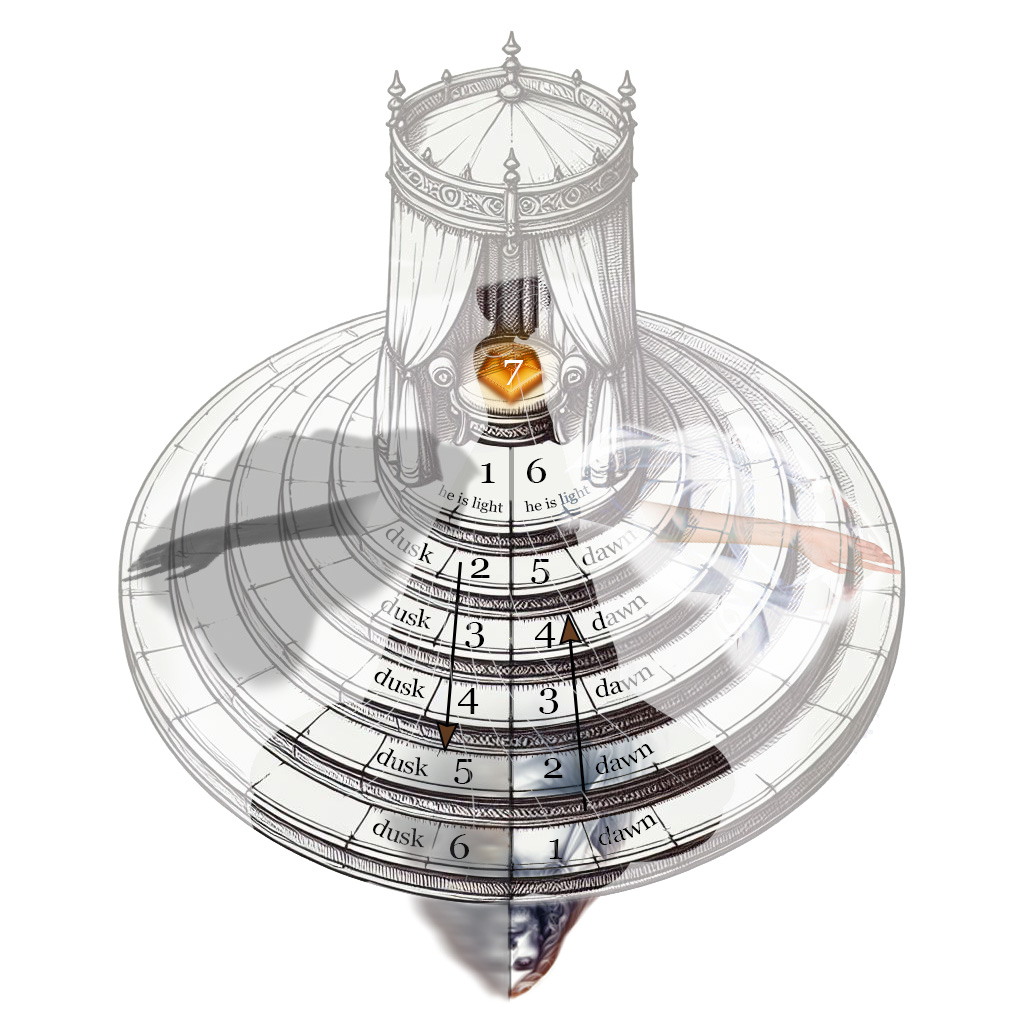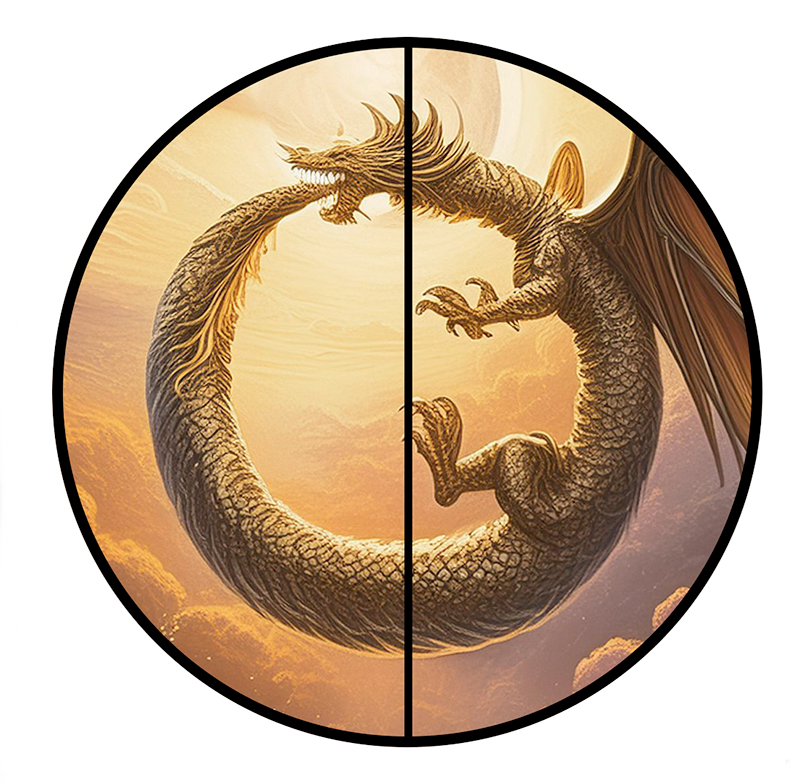He is Favored 3
This one came toward himself of night and said to self, "Abounding One ("Rabbi"), we see that you have come away from God, a teacher, for no one is able to make these Signs which you, yourself are making, unless the God should be in company with himself!"
The Reason it was always "Kingdom"
The Salvation separated and said to self, "Trustworthy One Trustworthy One! I am saying to yourself, unless anyone should be fathered from above, he is not able to perceive the Queen of the God!"The Only Fathered Man From Herself Above
Conqueror of the People is saying to self, "How is a man able to be fathered, he who is an old man? He is not able to enter into the Womb of the Mother of himself a second time and be fathered."70cThe Salvation separated, "Trustworthy One Trustworthy One I am speaking to yourselves, unless anyone should be fathered from out of water and of spirit, he has no power to enter into the Queen of the God.
Flesh of my Flesh, Bone of my Bone
The one fathered out of the Flesh, is flesh. And the one fathered out of the Spirit, is a spirit.
Do not marvel that I said to yourself, It is necessary for yourselves to be fathered from above.
Bringing/Leading Under the Wings
The Spirit is blowing wherever it desires, and the Voice of itself you are hearing, but you have not seen where she is coming from, and to where she is bringing under. In this manner is everyone who is fathered from out of the Spirit."Conqueror of the People separated and said to self, "How is it possible for these things to become?"
Yourself is the Teacher
The Salvation separated and said to self, "You, yourself are the Teacher of God Contends! And these things you don't recognize!
"And he might
sleep and wake upnight and dayand the Seed should sprout and grow long, and he sees not how. (Mark 4:27 RBT)Trustworthy One, Trustworthy One! I am speaking to yourself, that whatever we have seen, we are chatting, and whoever we have seen we are bearing witness to, and you are not taking hold of the Testament of ourselves.
If as the Earthly Beings I spoke to yourselves, and you are not trusting, how will you trust unless I speak to yourselves as the Heavenly Beings?70h
He who has Climbed Down
And no one has climbed up into the Heavenly One, except the one who has climbed down from out of the Heavenly One, the Son of the Human, the one who is being within the Heavenly One.A serpent of the Bronze One
And according to how Drawn Out ("Moses") exalted the Serpent within the Desolate/Solitary one, in this way it is necessary for the Son of the Human to be exalted,so that everyone who trusts within self might hold eternal (aiōn) zoe-life.

For thus God loved Himself
For thus the God agape-loved the Order, insofar that he gave the Son, the Only Begotten One, so that everyone who is trusting into Himself, might not be completely destroyed, but rather hold an eternal (aiōn) zoe-life.Not to Create Separatists
For the God did not send away the Son into the Order in order to separate70d the Order, but rather so that the Order might be saved straight across through himself.The one who is trusting into himself is not picked-out/separated, but the one who is not trusting has already been picked-out/separated because he has not trusted into the Name of the One-of-a-Kind son of the God.
Zoe-Life: Separation of Darkness from the Daylight
And she, herself is the Separation, for the Daylight has come into the Order, and men agape-loved [gave themselves to] the Dark One rather than the Daylight. And so the Works of themselves were being pain-ridden/laborious ones.For everyone practicing cheap/easy things is hating the Daylight, and does not come toward the Daylight, in order that the Works of himself may not be exposed.
אני אמרתי אלהים אתם - "I, Myself have spoken, 'Your eternal selves are mighty ones!" Psalm 82:6
And the one who is making the Real/True one is coming toward the Daylight so that the Works of Himself may be made manifest that they are being those which have been worked within a god!Beyond these things the Salvation came, and the Learners of Self, into the Caster ("Judean"), an earth, and he spent time in company with themselves in that place. And he kept plunging.
And the Favored was also plunging in Place of Little Eye/Spring ("Aenon"), near the Place of Complete ("Salim"), because the waters in that place were multitudinous, and they were becoming present and being plunged.

For the Favored was not yet being him who was cast into the Prison-Watch.
Therefore she became a searching from out of the Learners of Favored, in company with a Caster around to purification/cleansing.
And they came toward the Favored and said to self, "My Abounding One ("Rabbi"), he who was with yourself on the other side of the Descending ("Jordan"), to whom you, yourself have borne witness, behold! This one is plunging! And all are coming toward himself!"70e
The Favored separated and said, "A man has no power to take hold of either one, except it be that which is given to self from out of the Heavenly One.
I am not I
Themselves, you, yourselves, are bearing witness to myself that I spoke, "I, Myself am not myself,70f the Anointed One, but rather that I am him who has been sent away in front of that one.The one who holds the Bride is the Bridegroom. And the Friend of the Bridegroom, the one who has stood ready and the one who hears himself, for joy rejoices because of the Voice of the Bridegroom: "She therefore, my own joy, is filled up!"71 It is necessary to increase that one, and to decrease myself.
The Complete Man
The one from on top, he who is coming, is on top of all. The one who is from out of the Earth, from out of the Earth he is, and he is uttering from out of the Earth. The one from out of the Heavenly One, he who is coming, is on top of all.
Whoever has perceived and heard this, he is bearing witness, and no one is taking hold of the Testament of Himself.
The one who has taken hold of the Testament of Himself, he has set a signet-seal that he is the True God.
For whosoever the God sent away, he is chatting the Sayings of the God, for he is not giving the Spirit from out of a measure.
The Father is agape-loving the Son, and he has given all things within the Hand of Himself.
The one who is trusting into the Son, he is holding an eternal (aiōn) zoe-life. But the one who is being disobedient to the Son, he will not perceive a zoe-life, but instead the Wrath of the God, she remains against himself.
Footnotes
Greek τῆς μητρὸς αὐτοῦ δεύτερον. the mother of himself second. δεύτερον (deuteron) means second in place, rank. Not twice, or again, or a second time.
The adjective ἐπουράνιος (from ἐπί + οὐρανός) originally denotes a qualitative or ontological relation to the divine, not a spatial or topographical location. In early Greek—especially Homeric and classical texts—it describes the gods and divinized entities as celestial in nature (θεοὶ ἐπουράνιοι, Od. 17.484; Il. 6.129) or souls elevated in status (εὐσεβέων ἐπουράνιοι ψυχαί, Pind. Fr. 132.3), and not as beings in a place called “heaven.”
The phrase ἡ ἐπουράνιος πορεία in Plato (Phaedr. 256d) similarly refers to a metaphysical or mythic journey, not spatial ascent. In later Koine, particularly in the New Testament, ἐπουράνιος and its inflected forms (e.g., ἐν τοῖς ἐπουρανίοις) have been skewed into quasi-spatial interpretations—i.e. "in heavenly realms" or divine loci, or as "things of heaven" all of which are profoundly ambiguous interpretations. However, this shift was driven by the theological and cosmological developments in early Christianity and should be recognized as a conceptual reinterpretation rather than a continuation of earlier Greek usage. The spatial reading, though common in translation and doctrine, is not philologically grounded in the classical attestations of the term.
Not to Pick out and Separate
Greek κρίνω. Strongs #2919, krinó.
- to separate, put asunder; to pick out, select, choose (Homer, Herodotus, Aeschylus, Sophocles, Xenophon, Plato, others; μετά νεανίσκων ἀρίστων κεκριμένων (chosen, picked), 2 Macc. 13:15; κεκρίμενοι ἄρχοντες, Josephus, Antiquities 11, 3, 10); hence,
- to approve, esteem: ἡμέραν παῥ ἡμέραν, one day above another, i. e. to prefer (see παρά, III. 2 b.), Romans 14:5 (so τί πρό τίνος, Plato, Phil., p. 57 e.; τόν Ἀπολλῶ πρό Μαρσυου, rep. 3, p. 399{e}.); πᾶσαν ἡμέραν, to esteem every day, i. e. hold it sacred, ibid.
- to be of opinion, deem, think: ὀρθῶς ἔκρινας, thou hast decided (judged) correctly, Luke 7:43; followed by an infinitive Acts 15:19; followed by a direct question, 1 Corinthians 11:13; τοῦτο, ὅτι etc. to be of opinion etc. 2 Corinthians 5:14; followed by the accusative with an infinitive Acts 16:15; τινα or τί followed by a predicate accusative, κρίνειν τινα ἄξιον τίνος, to judge one (to be) worthy of a thing, Acts 13:46; ἄπιστον κρίνεται, Acts 26:8.
The primary meaning of this couldn't be more clear. He is not sent to pick out, approve, esteem, or separate people according to opinion, etc.
Greek οὗτος βαπτίζει. this one he submerges/baptizes. οὗτος meaning "this one" is in the masculine dative case, which means it is simply wrong to put it for the subject of the verb.
Greek ὅτι εἶπον ἐγώ οὐκ εἰμὶ ἐγώ. that I spoke I am not I.
The most textual critical editions of the Greek NT based on the earliest manuscripts. Later copies of the NT perhaps considered that 'ego' was repeated accidentally and removed it. In the most recent modern critical editions the word "because/that" is placed in between brackets [ὅτι]. See both the NA28 and UBS5 edition on this verse. Thus, the reader is presented with two choices of readings:
"that I said that" or "that I said I am not I". Which makes less sense? "That I said that" is most certainly redundant and makes no sense as ὅτι is a demonstrative conjunction, and is not what is found in the earliest manuscript evidence.
Κατὰ Ἰωάννην 3:28 Greek NT: Westcott and Hort 1881
αὐτοὶ ὑμεῖς μοι μαρτυρεῖτε ὅτι οὐκ εἰμὶ ἐγώ ὁ Χριστός, ἀλλ' ὅτι Ἀπεσταλμένος ἐκεῖνος ἐκείνου ἐγὼ οὐκ εἰμὶ ἔμπροσθεν ἐκείνου.
Κατὰ Ἰωάννην 3:28 Greek NT: Westcott and Hort / [NA27 and UBS4 variants]
αὐτοὶ ὑμεῖς μοι μαρτυρεῖτε ὅτι οὐκ εἰμὶ ἐγώ / ὅτι οὐκ εἰμὶ ἐγώ ὁ Χριστός, ἀλλ' ὅτι Ἀπεσταλμένος ἐκεῖνος ἐκείνου ἐγὼ οὐκ εἰμὶ ἔμπροσθεν ἐκείνου.
The Westcott and Hort edition and subsequent critical editions (Nestle-Aland and United Bible Societies' editions) prioritized the examination of the earliest manuscripts for reconstructing the original text of the New Testament.
The reasoning behind this approach is that earlier manuscripts are generally considered to be closer in time to the original writings of the New Testament authors and are thus more likely to preserve the original wording accurately. Therefore, these critical editions typically give more weight to readings found in earlier manuscripts when determining the most likely original text.
What this tells us is that the "extra" word ἐγώ ego (I/Myself) had been removed in many editions:
Κατὰ Ἰωάννην 3:28 Greek NT: RP Byzantine Majority Text 2005
... ὅτι εἶπον, οὐκ εἰμὶ ἐγώ ...
Κατὰ Ἰωάννην 3:28 Greek NT: Greek Orthodox Church
... ὅτι εἶπον· οὐκ εἰμὶ ἐγώ ...
Κατὰ Ἰωάννην 3:28 Greek NT: Tischendorf 8th Edition
... ὅτι εἶπον· οὐκ εἰμὶ ἐγώ ...
Κατὰ Ἰωάννην 3:28 Greek NT: Scrivener's Textus Receptus 1894
... ὅτι εἶπον, οὐκ εἰμὶ ἐγώ ...
Κατὰ Ἰωάννην 3:28 Greek NT: Stephanus Textus Receptus 1550
... ὅτι εἶπον, οὐκ εἰμὶ ἐγώ ...
Water is associated with the feminine throughout the Bible. Women drawing water, carrying jars, the Sea, etc. She is filled, or she is poured out; filled or empty. Light is often associated with the masculine, giving rise to the natural context of water and light: photosynthesis. Photosynthesis produces our food and oxygen (air), the fundamental sustenance for life on Earth.